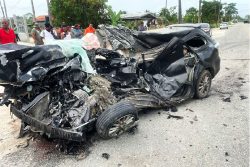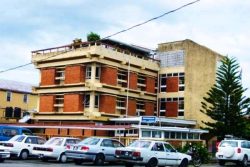(Jamaica Gleaner) The contents of a recent letter from Gaston Browne, the Antigua and Barbuda prime minister, to his Barbados counterpart, Mia Mottley, appears to reflect both frustration in St John’s and long-running difficulty among Carib-bean Community (CARICOM) leaders to agree and implement common policies.
In his widely circulated letter dated November 12, 2020, Browne complained of the “unwarranted classification” of his country as first, ‘high-risk’, then, a week later after the government in St John’s protested, ‘medium-risk’ for COVID-19 infection, “when the facts tell a quite different story”.
Sister CARICOM states St Lucia and St Vincent and the Grenadines, along with Australia, Bermuda and New Zealand, were also categorised as medium-risk, which means travellers from these countries must present a valid negative result of a PCR test taken no more than three days before travel to Barbados.
At the time, there were five confirmed active COVID-19 cases in Antigua – the number has risen to seven as of November 21. This compared favourably with Dominica – which had 27 active cases – yet Barbados listed Dominica – along with Anguilla, China, Grenada, Montserrat, and St Kitts and Nevis – as very low-risk. People visiting Bridgetown from these countries do not need to produce a negative PCR test result and are free to move around the island as soon as they clear immigration.
There has been no public response from Bridge-town to Browne’s letter, or to a threat by Everly Paul ‘Chet’ Greene, the Anti-guan foreign affairs minister, to take the issue to CARICOM. However, health officials in Barba-dos have said in the past that countries are categorised based on the level of infection and positivity rate over a seven-day period.
In agreeing to establish a so-called travel bubble among member countries when they met on September 11, CARICOM leaders accepted a recommendation from the Trinidad-based Caribbean Public Health Agency (CARPHA) to apply a standard of 20 active cases per 100,000 population over a 14-day period.
If this formula were applied, Dominica’s rate of active cases would jump to 37 based on a population of 72,053, according to the latest United Nations estimates. Antigua’s, on the other hand, would have been five, based on the UN’s latest estimated population of 97,929.
The apparent inconsistency in the application by Barbados has raised questions about other possible motives, such as the long-running squabble between the two countries over the comatose regional carrier, LIAT.
“I think that the issue regarding Antigua and Barbados has a lot more to do with the LIAT saga, and the fact that it has soured relations between the countries, and I think the leaders probably need to sit down and have a drink with one another at some state,” Barbadian political scientist Peter Wickham told The Gleaner.
“But the reality is that the issue with this bubble, and Antigua’s relationship to the bubble and treatment by Barbados, has a lot more to do with the deeper issue – that relations between the countries are really not the best at this stage, and there’s some work that needs to be done regarding improving those relations.”
Relationship issues notwithstanding, the travel bubble, which became effective on September 18, came with its own problems. The heads of government had agreed that countries within the bubble would fall in categories ranging from those with no COVID-19 cases to those with low, medium, high and very high risk, and that only countries with no cases and those in the low-risk category would be allowed to participate in the bubble.
Based on the rates of active cases at the time, it was agreed that initially, Antigua and Barbuda, Barbados, Dominica, Grenada, Montserrat, St Kitts and Nevis, St Lucia, and St Vincent and the Grenadines would be the first countries in.
However, cracks began to appear soon after, as first, Grenada, followed by St Vincent and the Grenadines, and later St Kitts and Nevis and Barbados withdrew from the bubble, leading Browne to exclaim on a local radio station that “the bubble has burst!”
The leaders had agreed that residents of the qualifying CARICOM countries would forgo COVID-19 testing and mandatory quarantine. But some countries were never comfortable with this arrangement, citing a number of health concerns.
“Participation in the CARICOM bubble with countries of higher risk assessment and less stringent protocols would expose citizens and residents to elevated health risks,” Dr Timothy Harris, the St Kitts and Nevis prime minister, said earlier this month as he announced his country was pulling out of the arrangement.
And, although the CARICOM leaders later revised the protocols to require travellers within the bubble to present a negative PCR test result, this could not save the bubble.
While supporting her government’s decision to quit the bubble, the Grenada’s tourism minister, Dr Clarice Modeste, expressed disappointment that the regional grouping could not agree on a common set of protocols to deal with travel during the pandemic.
However, the Antiguan diplomat Sir Ronald Sanders argued that this would be difficult beyond a minimum level due to the vast differences in population size, medical resources, and different impacts caused by the pandemic.
“There has been an effort by CARICOM leaders to approach curbing COVID-19 collectively. However, different circumstances in each country dictate that an identical approach cannot work. Within a collective CARICOM approach on how best to tackle the effects of the pandemic from both a public health and economic standpoints, specific country challenges require specific responses,” Sir Ronald, the ambassador extraordinaire and plenipotentiary to the United States and the Organization of American States, told The Gleaner.
His view was supported by Wickham, the political scientist, who compared the situation in the region to that of the Europe Union, where the initial plan was for a continent-wide policy before they settled on cooperation and an alignment of policies, where possible.
“If I were to translate that to the Caribbean, the differences that we are seeing relate to a different reality,” said Wickham. “In the same way that integration relies heavily on an appreciation that policy differs, I think this is the same thing that’s happening here – that policies are different depending on where you are, the exposure to tourism [and] the impacts of COVID. And all of these reasons perhaps explain why you’ve had different policies.”
BEGAN TO FALL APART
The subject of a bubble first arose at a meeting on May 5 at which the leaders discussed a phased reopening of borders to tourists and agreed that CARPHA would develop a regional health policy to guide member states through and after COVID-19.
The CARPHA proposals presented at that meeting included suggested criteria for a protocol on the reopening of airports for intraregional travel.
Things began to fall apart by late July after Barbados, which had initially placed Jamaica in the medium-risk category, updated its protocols and listed Kingston as high-risk. This meant a person travelling from Barbados to Jamaica did not need to present a negative PCR test result, while those travelling in the reverse direction were required to have one.
In early August, Bridgetown also added a bubble in addition to its low-, medium- and high-risk categories, listing Dominica, Grenada, St Kitts and Nevis, St Lucia, and St Vincent and the Grenadines as the bubble countries.
Sir Ronald, the Antiguan diplomat, described the bubble as “a good aspiration” whose collapse did not mean there’s growing insularity among the CARICOM states. What it showed, he said, was that governments’ primary responsibility was the safety of their people.
“Restrictions on the travel bubble are understandable. Until COVID-19 is brought under control globally, and particularly from the source markets for visitors to the Caribbean, individual governments have to act in accordance with the advice of their medical experts. That does not mean that governments are insular or uncooperative,” he said.








